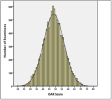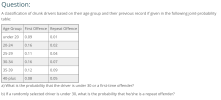Hey team. My score was 67 8/8/9, and I'm trying for NFO (1st) and Supply (2nd). I got hit on an old puberty-related medical thing, though, and MEPS told me that they'd clear me as soon as they put the records on...record... (on the plus side, it's not disqualifying), but that takes a month where I am because of high flow, so you won't be seeing me this board.
In general, other than airwarriors, I had no prior knowledge of the test, or prior knowledge of aviation, or of ships in general. This forum saved me, and I'll give the same advice as everyone else - read through it all. The more of the forum you read, the more you'll succeed. Good luck.
General
Now, backstory. I was originally looking at joining the Army, so took the ASVAB/Picat at the army recruiting base (scored 99) and they told me not to go officer. Since my family is only going to approve of this career direction if I manage to score a commission or find my way into the Navy/Air Force, I called the Navy Officer Recruiter in my area. The whole process from me leaving the Army station to taking the ASTB took me about 3 weeks (I was getting bounced around between LA and San Diego), and MEPS another month (partially because of covid).
I found that taking the ASVAB beforehand gave me a general idea on the direction the mechanics and math sections would go. You can think of it as a pre-warmup. I wouldn't take the ASVAB in addition to the ASTB unless you're thinking of going for both enlisted and officer. I definitely wouldn't take it at the Army, because they screwed me over a bit on timing - but that's a story for another time.
I watched three general youtube videos that I believe were useful for the test. Watch all three.
Math
Best advice I can give is go through the drive a couple of times. The better you understand the fundamentals, the better you'll end up doing on the OAR sections. Make sure you understand things like Distance/Rate/Time, make sure you know what 18! would mean in a question, and if you've got a solid foundation (i.e. did well in High School math) make sure to brush up on matrices - got a couple of those towards the end. I also had questions on log, sqrt, and ln. I'm linking the drive again just in case you as a viewer don't have it on file.

drive.google.com
^
This same gouge is useful for all of the OAR sections.
Reading
I thought I failed this section, though the score means I didn't. A lot of the questions felt brain-dead easy, and a few of them felt impossible. Read the snippets a couple times over if you have to, I know it helped me. If your ASTB test date is a little ways off you can consider just reading through some news articles to improve your comprehension speed.
Mechanics
This was easy enough for me at the beginning, because it's all logic based. Think pulleys, levers, pistons, ramps. At some point something went wrong, because they asked me two just impossible questions (impossible because I haven't taken any science-y classes in 5 or so years).
The first went something like this; "If you want to increase the power flow from a nuclear control rod, do you raise it or lower it to affect electrons/neutrons." I just guessed. If you happen to know how protons, neutrons, and electrons work, your guess will probably be better than mine. The second was about how valence electrons worked. I also guessed on that question. The easier questions were very similar to the gauge, though, and I got three or four about a weight on one end of a pulley vs the force needed for the other end, and a few questions on multiple-circle-thing pulley systems.
Flight Sections
ANIT
I studied with two sets of flashcards, both of which can be found online. I only have the link saved for one of them, though, so you'll have to use that one. My ASTB was scheduled about a week after I decided to take it, for reference on how long I had to learn this from scratch.
You'll need to know
by heart, at the very
bare minimum:
-Parts of a ship
-Parts of a plane
-Squawking 7500, 7600, 7700, 7777. I found a neat rhyme online to remember this - "75 taken alive, 76 technical glitch, 77 going to heaven". 7777 is military designation, which was easier to remember for me because of the lack of 0's.
-Longitudinal, Vertical, Lateral axes on a plane, what parts control the movement around that axis, and what the movement is called. Pitch is nose up/down, yaw is nose left/right, roll is...roll. The three parts, in the same order, are elevators, rudder, aileron. If you want to be near a plane at all, you'll need to know this, so don't cram and forget this part.
-Warm fronts vs cold fronts
I didn't get any questions on weather, but I had the whole section memorized because that's come up pretty often in other peoples' after-reports. Having naval history and famous achievements (think the Moon, Eugene Ely, the X1) memorized
will get you free points, but it all depends on how much time you have before you take the test. Prioritize the easiest to learn things, and the harder things will come more naturally.
Do these flash cards until you can answer it without even thinking. Do the memorize thing until you can get at least 400 correct in the first round.
Study Flashcards On ASTB Aviation/Nautical Information Test (ANIT) [comprehensive] at Cram.com. Quickly memorize the terms, phrases and much more. Cram.com makes it easy to get the grade you want!

www.cram.com
UAV
By far the easiest section on the entire ASTB if you use the compass trick. Here it is; watch it twice, watch it thrice, try it twenty times at home, make sure you got it right, then do it exactly the same at the test. If it helps, pretend the arrow always has to go up. You'll get a chance to practice it again at the test if you click the back button in the allocated practice time, so use it carefully.
Enhance your skills for the TBAS UAV section with this focused preparation quiz. It tests knowledge of directions essential for aspiring pilots, helping to improve navigation skills and readiness for the TBAS assessments.

www.proprofs.com
Dichotic Listening
Now, the old links for this don't work, so I went in on this relatively blind other than the leaning thing. It helped a little. Closing my eyes to center my focus helped more. They'll say a series of numbers and letters, and whenever an odd number comes up in X ear, click button A, and whenever an even number comes up in Y ear, click button B. Breathe deep between sections.
Side note also make sure you're wearing the headphones on the right way.
Stick and Throttle
This is both the easiest and hardest section of the test. Easiest because if you play a lot of games like me, parts of it will come naturally. I "studied" by turning on my PS4, putting the Nier:Automata disc in, and turning the camera to inverted and just running around for a while to get used to it. War Thunder with an XBOX controller is probably profoundly better for practice.
In your left hand will probably be the throttle, and you'll have to be careful because the more/less was a little unintuitive for me. It'll be the only thing happening at first, though, which means you have the first twenty seconds to get it right. Mine wasn't plugged in at first though, lol, so I didn't get to do the practice run.
In your right hand will be the stick, which will first make you calibrate it in non-inverted movements, and then inverts when the test begins. This felt like it was just an attempt to throw you off, so just keep in mind that it'll be inverted for the test.
When the test gets to doing both the stick and throttle at once, focus on the stick and glance over at the throttle every five or ten seconds to make sure you're hovering in the right area.
When the emergency measures occur, do those immediately, and then go back to the rest. The emergency measures are both faster to do and more important because your test ends if you don't do it properly. Make sure to hit the little button thing that they tell you to hit, you'll know what I mean. Also, once you complete two emergency measures, you should be able to guess the third one, so at the end of the second measure you can actually prepare the sequencing for the third in your head. Make sure you memorize all of the measures, and use the scrap paper to write down what you have to do as well.
Other
1. Make sure you sleep as best you can the night before. Go through everything one more time the day before, but extra cramming at that point won't help all too much.
2. Bring a drink. I got real thirsty about halfway through.
3. Don't psyche yourself out. You might feel like you're doing horribly, like you're failing yourself, but you're probably not. Stay confident, stay focused, stay calm, and it'll work out.
4. Read through this thread and other threads. Seriously, I can't stress enough how much it helped me. Work your way back in time until it no longer feels like useful information, then go find another thread to look at. The more you read the more you succeed.





